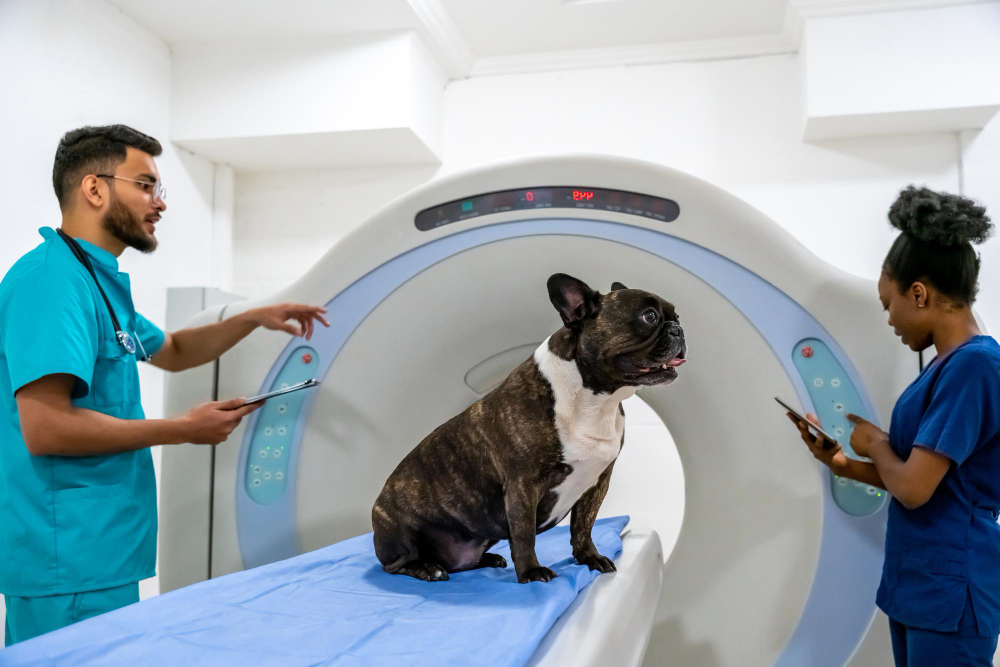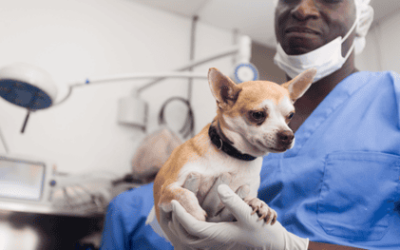How Much Does a Dog MRI Cost? A Breakdown of the Prices

Updated May 23, 2025
Understanding Dog MRI Costs: What Pet Parents Should Know
When your dog isn’t feeling their best, it’s natural to want answers fast. An MRI (Magnetic Resonance Imaging) can be one of the most effective ways to get a clear picture of what’s going on inside your pup’s body, especially for more complex health concerns. But before scheduling a scan, many pet parents wonder about the actual costs of testing.
The answer isn’t always straightforward, but from average pricing to what influences the final cost, and even how to financially prepare, this guide will help you feel more confident and informed as you navigate your dog’s care.
What Is A Dog MRI and Why Is It Important?
A dog MRI, or Magnetic Resonance Imaging, is a noninvasive test that gives detailed images of a dog’s internal structures, including bones, organs, and soft tissues. This advanced imaging technique uses strong magnetic fields and radio waves to create precise, cross-sectional images of the body. It allows vets to detect and diagnose medical conditions with high accuracy.
The importance of an MRI for dogs cannot be overstated. It is significant in identifying and evaluating a wide range of health issues, such as:
- Neurological disorders (e.g., brain tumors, spinal cord injuries)
- Musculoskeletal problems (e.g., joint injuries, bone abnormalities)
- Soft tissue injuries (e.g., ligament or tendon tears)
- Abdominal or thoracic abnormalities (e.g., organ diseases, masses)
What Affects the Cost of an MRI for Dogs?
The cost of a dog MRI can vary, sometimes quite a bit, and it often depends on a few key factors:
- Where You Live: Clinics in larger cities or areas with a high cost of living may charge more than those in smaller towns or rural communities.
- The Clinic’s Expertise: Veterinary hospitals with specialized imaging equipment or highly experienced staff may have higher fees, but they also tend to provide more accurate diagnoses.
- Your Dog’s Specific Needs: The type of condition being investigated matters. A brain scan for suspected neurological issues, for instance, may take longer and require more detailed imaging than other areas.
The Average Cost of a Dog MRI
While the cost of a dog MRI can vary significantly based on the factors mentioned above, the average cost is between $2000 and $6000.
Breaking Down the Expenses
However, most local vets don’t usually have the advanced equipment needed for MRI scans. Because of that, they often send clients to specialists or animal hospitals where radiologists are available. MRIs are more complicated than other imaging tests and usually require sedation, which means both pre- and post-care are necessary.
When you’re looking at the total cost of an MRI for your dog, it helps to break down where all the charges come from. Here’s a closer look at what you might expect:
- Specialist Consultations ($250 – $500+): If a specialist is needed to interpret the MRI or recommend treatment.
- Pre-Anesthesia Testing ($50 – $150): Blood work or other tests to make sure your dog can safely undergo anesthesia.
- Anesthesia ($200 – $500): The cost of administering and monitoring anesthesia during the MRI.
- MRI Scan ($2,000 – $4,000): This is the core price of the MRI itself.
- Additional Images ($2,000 – $4,000): The cost can double if multiple areas, like the brain and spine, need to be scanned.
- Veterinarian Fees ($75 – $200): Charges for the vet interpreting the results.
- Hospitalization ($300 – $800): Sometimes, your dog may need to stay overnight for monitoring or fluids.
- Follow-Up Care ($100 – $3,000+): Any additional treatments or consultations after the MRI.
Ways to Manage the Cost
Vet bills can add up fast, but there are options to help ease the financial pressure:
- Pet Insurance: If you have coverage, check to see if diagnostic procedures like MRIs are included. This can make a huge difference in your out-of-pocket expenses.
- Payment Plans: Some veterinary clinics offer payment options so you can spread out costs over time.
- Third-Party Financing: Services like CareCredit are designed for medical expenses and may offer interest-free plans (just be sure to read the fine print).
What to Expect During the MRI Process
If your dog is scheduled for an MRI, here’s what the day might look like:
- Pre-Scan Checkup: Your vet will make sure your dog is healthy enough for anesthesia.
- The MRI: Once sedated, your dog will be placed gently in the scanner. The scan usually takes between 30–90 minutes.
- Recovery: After the scan, your dog will be monitored as they wake up from anesthesia.
- Reviewing Results: The vet will go over the images with you and talk about any next steps.
How to Prepare Your Dog for an MRI
A little prep can go a long way in making the experience smoother:
- Fasting: Your vet will likely ask you to withhold food for several hours beforehand.
- Comfort Items: Bring along a favorite blanket or toy to help soothe your dog before and after the procedure.
- Stay Calm: Dogs often pick up on our emotions. A calm, confident tone from you can help them feel safe, even in unfamiliar settings.
How Can Pet Insurance Help You if Your Dog Needs an MRI?
Pet insurance can be a valuable tool in managing the costs of treating a dog’s veterinary expenses. By having a pet insurance policy in place, you can have peace of mind knowing that you can provide medical care for your furry companion without worrying about the financial burden. Pet insurance can help cover the costs of veterinary consultations, diagnostic tests, medications, and even specialized treatments if required.
What Does Odie Pet Insurance Cover?
Pet insurance covers various veterinary expenses, providing financial protection and peace of mind for pet owners. Here are the details of the coverage options offered by Odie Pet Insurance:
Illness & Injury Plan
The Illness & Injury Plan is an all-inclusive insurance plan designed to cover a wide range of medical needs for your pet. This plan includes comprehensive coverage for various illnesses, injuries, and veterinary services. Some of the covered items include:
- Veterinary exams and consultations
- Diagnostics (e.g., X-rays, lab tests)
- Prescribed medications
- Surgeries and hospitalization
- Rehabilitation, acupuncture, or chiropractic treatments
- Medically necessary supplies
- Euthanasia and cremation
The Wellness Plan
The Wellness Plan is a monthly membership that focuses on preventive care and covers routine veterinary services.
- Provides reimbursements for routine care items such as wellness visits (exams and vaccines), testing and parasite prevention, dental cleanings and at-home dental care, vitamins, supplements, and more.
- Through Odie’s partnership with Petivity, a leader in smart pet products and proactive care, Wellness Plan members can also receive reimbursements for Petivity devices and health kits, as well as eligible Purina food and supplements.
- Total reimbursement up to $700 per year.




